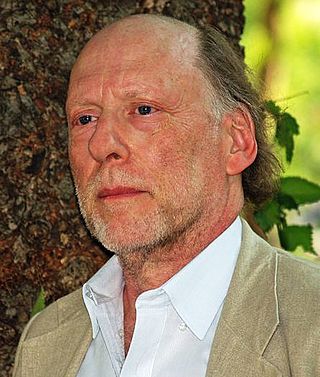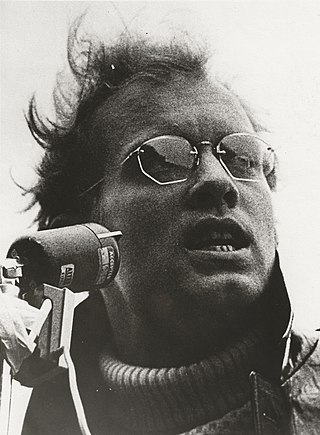
A hippie, also spelled hippy, especially in British English, is someone associated with the counterculture of the 1960s, originally a youth movement that began in the United States during or around 1964 and spread to different countries around the world. The word hippie came from hipster and was used to describe beatniks who moved into New York City's Greenwich Village, San Francisco's Haight-Ashbury district, and Chicago's Old Town community. The term hippie was used in print by San Francisco writer Michael Fallon, helping popularize use of the term in the media, although the tag was seen elsewhere earlier.

Steal This Book is a book written by Abbie Hoffman. Written in 1970 and published in 1971, the book exemplified the counterculture of the sixties. The book sold more than a quarter of a million copies between April and November 1971. The number of copies that were stolen is unknown.

Joan Chandos Baez is an American singer, songwriter, musician, and activist. Her contemporary folk music often includes songs of protest and social justice. Baez has performed publicly for over 60 years, releasing more than 30 albums.

Jerry Clyde Rubin was an American social activist, anti-war leader, and counterculture icon during the 1960s and early 1970s. Despite being known for holding radical views when he was a political activist, he ceased holding his more extreme views at some point in the 1970s and instead opted for a successful career as a businessman. In the 1960s, during his political activism heyday, he was known for being one of the co-founders of the Youth International Party (YIP) whose members were referred to as Yippies, and standing trial in the Chicago Seven case.

Allard Kenneth Lowenstein was an American Democratic politician who served as the U.S. representative for the 5th congressional district in Nassau County, New York, for one term from 1969 to 1971.

Harris Llewellyn Wofford Jr. was an American attorney, civil rights activist, and Democratic Party politician who represented Pennsylvania in the United States Senate from 1991 to 1995. A noted advocate of national service and volunteering, Wofford was also the fifth president of Bryn Mawr College from 1970 to 1978, served as chairman of the Pennsylvania Democratic Party in 1986 and also as Pennsylvania Secretary of Labor and Industry in the cabinet of Governor Robert P. Casey from 1987 to 1991, and was a surrogate for Barack Obama's 2008 presidential campaign. He introduced Obama in Philadelphia at the National Constitution Center before Obama's speech on race in America, "A More Perfect Union".

Todd Alan Gitlin was an American sociologist, political activist and writer, novelist, and cultural commentator. He wrote about the mass media, politics, intellectual life and the arts, for both popular and scholarly publications.
Sheila Rowbotham is an English socialist feminist theorist and historian. She is the author of many notable books in the field of women's studies, including Hidden from History (1973), Beyond the Fragments (1979), A Century of Women (1997) and Threads Through Time (1999), as well as the 2021 memoir Daring to Hope: My Life in the 1970s. She has lived in Bristol since 2010.

David Victor Harris was an American journalist and activist. After becoming an icon in the movement against the Vietnam War, organizing civil disobedience against military conscription and refusing his own orders to report for military duty, for which he was imprisoned for almost two years, Harris went on to a 50-year career as a distinguished journalist and author, reporting national and international stories.
David Bender is an American political activist, author and former host of the talk radio show Politically Direct on Air America Radio.

Ernestine Anderson was an American jazz and blues singer. In a career spanning more than six decades, she recorded over 30 albums. She was nominated four times for a Grammy Award. She sang at Carnegie Hall, the Kennedy Center, the Monterey Jazz Festival, as well as at jazz festivals all over the world. In the early 1990s she joined Qwest Records, the label founded by fellow Garfield High School graduate Quincy Jones.
Sir Theodore Wilson Harris was a Guyanese writer. He initially wrote poetry, but subsequently became a novelist and essayist. His writing style is often said to be abstract and densely metaphorical, and his subject matter wide-ranging. Harris is considered one of the most original and innovative voices in postwar literature in English.
David Victor Mark Mallet is a British director of music videos and concert films. He was one of the most prolific directors of music videos in the 1980s.

Aaron Henry was an American civil rights leader, politician, and head of the Mississippi branch of the NAACP. He was one of the founders of the Mississippi Freedom Democratic Party which tried to seat their delegation at the 1964 Democratic National Convention.

The counterculture of the 1960s was an anti-establishment cultural phenomenon and political movement that developed in the Western world during the mid-20th century. It began in the early 1960s, and continued through the early 1970s. It is often synonymous with cultural liberalism and with the various social changes of the decade. The effects of the movement have been ongoing to the present day. The aggregate movement gained momentum as the civil rights movement in the United States had made significant progress, such as the Voting Rights Act of 1965, and with the intensification of the Vietnam War that same year, it became revolutionary to some. As the movement progressed, widespread social tensions also developed concerning other issues, and tended to flow along generational lines regarding respect for the individual, human sexuality, women's rights, traditional modes of authority, rights of people of color, end of racial segregation, experimentation with psychoactive drugs, and differing interpretations of the American Dream. Many key movements related to these issues were born or advanced within the counterculture of the 1960s.
Saadallah Wannous was a Syrian playwright, writer and editor on Arabic theater. He was born in the village of Hussein al-Bahr, near Tartous, where he received his early education. He studied journalism in Cairo, Egypt and later served as editor of the art and cultural sections of the Syrian official newspaper Al-Baath and the Lebanese daily As-Safir. For many years, he was also director of the department for music and theater in the Ministry for Culture and National Guidance of Syria.
Colin Burgess is an Australian author and historian, specializing in space flight and military history. He is a former customer service manager for Qantas Airways, and a regular contributor to the collectSPACE online community. He lives in New South Wales.

The Freedom Singers originated as a quartet formed in 1962 at Albany State College in Albany, Georgia. After folk singer Pete Seeger witnessed the power of their congregational-style of singing, which fused black Baptist a cappella church singing with popular music at the time, as well as protest songs and chants. Churches were considered to be safe spaces, acting as a shelter from the racism of the outside world. As a result, churches paved the way for the creation of the freedom song. After witnessing the influence of freedom songs, Seeger suggested The Freedom Singers as a touring group to the SNCC executive secretary James Forman as a way to fuel future campaigns. Intrinsically connected, their performances drew aid and support to the Student Nonviolent Coordinating Committee (SNCC) during the emerging civil rights movement. As a result, communal song became essential to empowering and educating audiences about civil rights issues and a powerful social weapon of influence in the fight against Jim Crow segregation. Their most notable song “We Shall Not Be Moved” translated from the original Freedom Singers to the second generation of Freedom Singers, and finally to the Freedom Voices, made up of field secretaries from SNCC. "We Shall Not Be Moved" is considered by many to be the "face" of the Civil Rights movement. Rutha Mae Harris, a former freedom singer, speculated that without the music force of broad communal singing, the civil rights movement may not have resonated beyond of the struggles of the Jim Crow South. Since the Freedom Singers were so successful, a second group was created called the Freedom Voices.
D'Army Bailey was an American lawyer, circuit court judge, civil rights activist, author, and film actor. Born and raised in Memphis, Tennessee, he served as a city councilman in Berkeley, California, from 1971 to 1973.
Frye Gaillard is an American historian and author.











